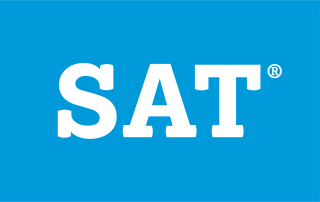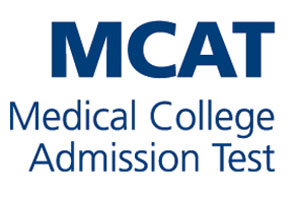
The ACT is a standardized test used for college admissions in the United States. It is currently administered by ACT, a nonprofit organization of the same name. The ACT test covers four academic skill areas: English, mathematics, reading, and scientific reasoning. It also offers an optional direct writing test. It is accepted by all four-year colleges and universities in the United States as well as more than 225 universities outside of the U.S.

The SAT is a standardized test widely used for college admissions in the United States. Since its debut in 1926, its name and scoring have changed several times. For much of its history, it was called the Scholastic Aptitude Test and had two components, Verbal and Mathematical, each of which was scored on a range from 200 to 800. Later it was called the Scholastic Assessment Test, then the SAT I: Reasoning Test, then the SAT Reasoning Test, then simply the SAT.

The Graduate Management Admission Test is a computer adaptive test (CAT) intended to assess certain analytical, writing, quantitative, verbal, and reading skills in written English for use in admission to a graduate management program, such as a Master of Business Administration (MBA) program. Answering the test questions requires knowledge of English grammatical rules, reading comprehension, and mathematical skills such as arithmetic, algebra, and geometry. The Graduate Management Admission Council (GMAC) owns and operates the test, and states that the GMAT assesses analytical writing and problem-solving abilities while also addressing data sufficiency, logic, and critical reasoning skills that it believes to be vital to real-world business and management success. It can be taken up to five times a year but no more than eight times total. Attempts must be at least 16 days apart.
Test of English as a Foreign Language is a standardized test to measure the English language ability of non-native speakers wishing to enroll in English-speaking universities. The test is accepted by more than 11,000 universities and other institutions in over 190 countries and territories. TOEFL is one of several major English-language tests worldwide, including IELTS, Duolingo English Test, Cambridge Assessment English, and Trinity College London exams.

Educational Testing Service (ETS), founded in 1947, is the world's largest private nonprofit educational testing and assessment organization. It is headquartered in Lawrence Township, New Jersey, but has a Princeton address.

The Law School Admission Test is a standardized test administered by the Law School Admission Council (LSAC) for prospective law school candidates. It is designed to assess reading comprehension, analytical reasoning, and logical reasoning. The test is an integral part of the law school admission process in the United States, Canada, the University of Melbourne, Australia, and a growing number of other countries.
Educational assessment or educational evaluation is the systematic process of documenting and using empirical data on the knowledge, skill, attitudes, aptitude and beliefs to refine programs and improve student learning. Assessment data can be obtained from directly examining student work to assess the achievement of learning outcomes or can be based on data from which one can make inferences about learning. Assessment is often used interchangeably with test, but not limited to tests. Assessment can focus on the individual learner, the learning community, a course, an academic program, the institution, or the educational system as a whole. The word 'assessment' came into use in an educational context after the Second World War.
The Swedish Scholastic Aptitude Test (SweSAT)(Swedish: högskoleprovet) is a standardised test used as one of the means to gain admission to higher education in Sweden. The test itself, which is administered by the Swedish Council for Higher Education, is divided into a mathematical part and a verbal part, which both respectively contain 4 subdivisions, in total 160 multiple-choice questions. All sections are taken in one day, a Saturday in April or a Sunday in October, lasting between 7½ and 8 hours including breaks between each section and a lunch break. Apart from the English language reading comprehension test, all sections are taken in Swedish.
The Preliminary SAT/National Merit Scholarship Qualifying Test (PSAT/NMSQT) is a standardized test administered by the College Board and cosponsored by the National Merit Scholarship Corporation (NMSC) in the United States. In the 2018–2019 school year, 2.27 million high school sophomores and 1.74 million high school juniors took the PSAT. Scores from the PSAT/NMSQT are used to determine eligibility and qualification for the National Merit Scholarship Program.
A concept inventory is a criterion-referenced test designed to help determine whether a student has an accurate working knowledge of a specific set of concepts. Historically, concept inventories have been in the form of multiple-choice tests in order to aid interpretability and facilitate administration in large classes. Unlike a typical, teacher-authored multiple-choice test, questions and response choices on concept inventories are the subject of extensive research. The aims of the research include ascertaining (a) the range of what individuals think a particular question is asking and (b) the most common responses to the questions. Concept inventories are evaluated to ensure test reliability and validity. In its final form, each question includes one correct answer and several distractors.
Cambridge Assessment English or Cambridge English develops and produces Cambridge English Qualifications and the International English Language Testing System (IELTS). The organisation contributed to the development of the Common European Framework of Reference for Languages (CEFR), the standard used around the world to benchmark language skills, and its qualifications and tests are aligned with CEFR levels.
Step 2 Clinical Skills of the United States Medical Licensing Examination (USMLE) was an exam administered to medical students/graduates who wish to become licensed physicians in the U.S. It is similar to the COMLEX-USA Level 2-PE exam, taken by osteopathic medical students/graduates who seek licensure as physicians in the U.S. For US medical students, the exam fee is $1,300. For medical students at non-US medical schools, the tests cost is higher—currently $1,535. These fees do not include costs associated with travel and lodging to take the test. Historically, US students have taken Step 2 CS late in their senior year, prior to graduation. However, now that more residency programs require students to record a passing score, many US medical schools recommend students take Step 2 CS in the fall of their senior year.
Cognitive tests are assessments of the cognitive capabilities of humans and other animals. Tests administered to humans include various forms of IQ tests; those administered to animals include the mirror test and the T maze test. Such testing is used in psychology and psychometrics, as well as other fields studying human and animal intelligence.
Advanced Placement (AP) Comparative Government and Politics is an Advanced Placement comparative politics course and exam offered by the College Board. It was first administered in 1987.

A high-stakes test is a test with important consequences for the test taker. Passing has important benefits, such as a high school diploma, a scholarship, or a license to practice a profession. Failing has important disadvantages, such as being forced to take remedial classes until the test can be passed, not being allowed to drive a car, or difficulty finding employment.
The Pennsylvania System of School Assessment (PSSA) is a standardized test administered in public schools in the state of Pennsylvania. Students in grades 3-8 are assessed in English language arts skills and mathematics. Students in grades 4 and 8 are also assessed in skills relating to natural science, including the field of data interpretation and analysis. Since 2013, high school students have taken the Keystone Exam in place of the PSSA for their standardized testing. The PSSA's were made by a company in New Jersey. The PSSA is written, owned and administered by Pearson Education. There are reporting categories for each subject which list eligible content to be tested in each grade. Assessment Anchors specify what is considered eligible content for each grade level tested. A Proficient or Advanced level is needed to be able to qualify as passing the PSSA.

An examination or test is an educational assessment intended to measure a test-taker's knowledge, skill, aptitude, physical fitness, or classification in many other topics. A test may be administered verbally, on paper, on a computer, or in a predetermined area that requires a test taker to demonstrate or perform a set of skills.

The Medical College Admission Test is a computer-based standardized examination for prospective medical students in the United States, Australia, Canada, and the Caribbean Islands. It is designed to assess problem solving, critical thinking, written analysis and knowledge of scientific concepts and principles. Before 2007, the exam was a paper-and-pencil test; since 2007, all administrations of the exam have been computer-based.
Cambridge Assessment Admissions Testing provides admissions tests for a range of university level courses and assessments in thinking skills and behavioural styles. It is part of Cambridge Assessment, a not-for-profit department of the University of Cambridge, England.

In the United States, those seeking to become lawyers must normally pass a bar examination before they can be admitted to the bar and become licensed to practice law. Bar exams are administered by states or territories, generally by agencies under the authority of state supreme courts. Almost all states use some examination components created by the National Conference of Bar Examiners (NCBE). Forty-one jurisdictions have adopted the Uniform Bar Examination (UBE), which is composed entirely of NCBE-created components.








